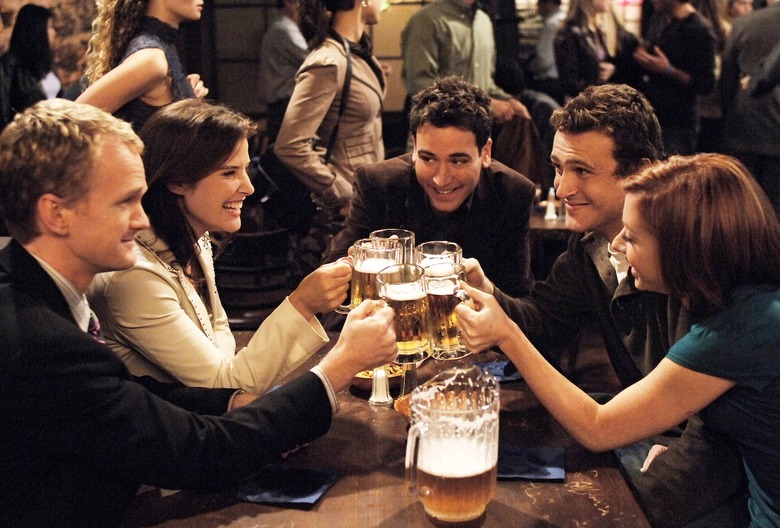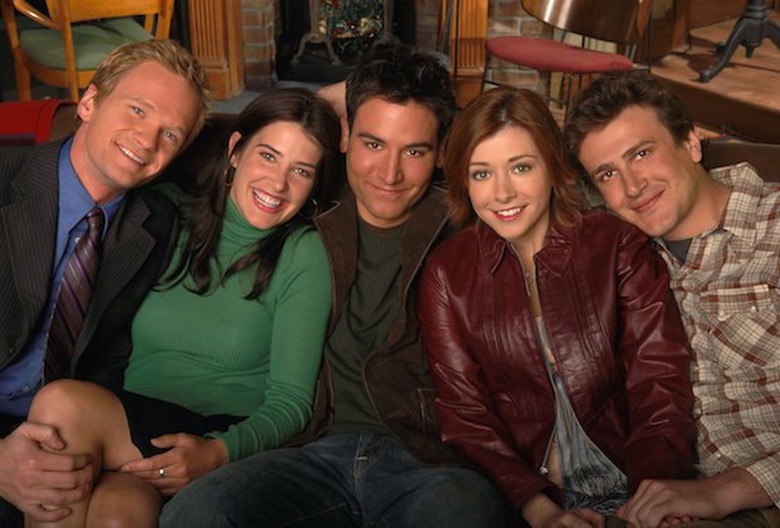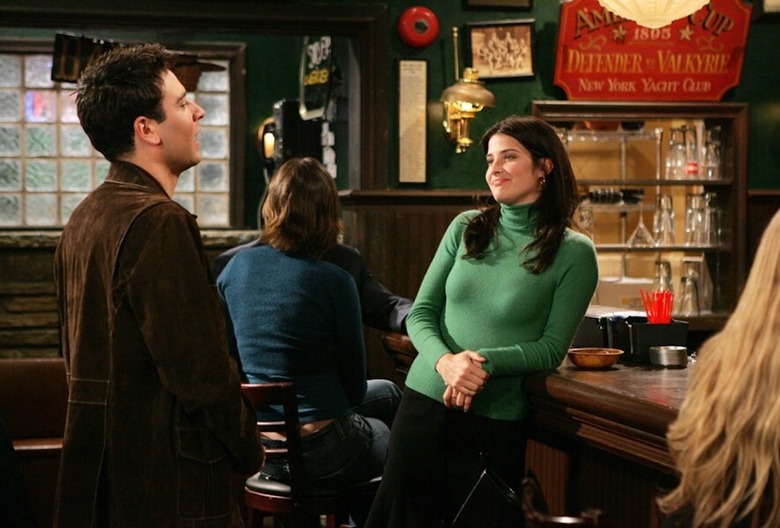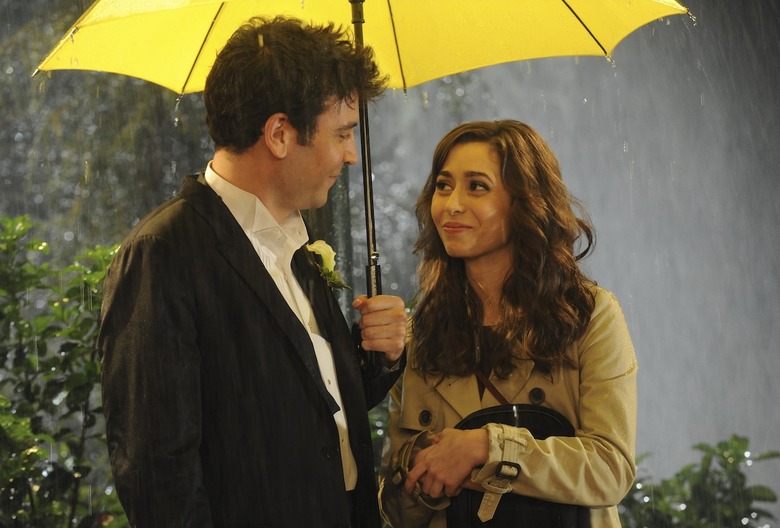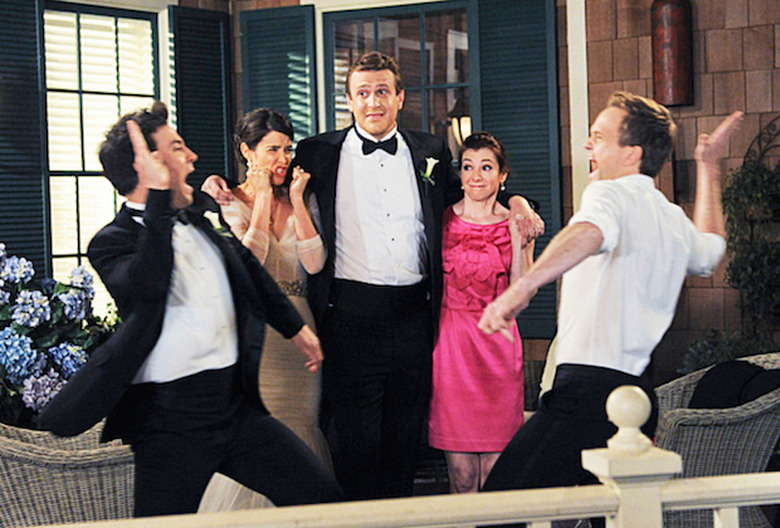HIMYM Turns 20: Co-Creator Craig Thomas On A Pivotal Ted/Robin Scene Cut From The Finale, Accidental Foreshadowing And More
We may receive a commission on purchases made from links.
How I Met Your Mother has been dissected, celebrated and debated for two full decades.
To mark its 20th anniversary, TVLine caught up with co-creator Craig Thomas, who is currently revisiting all 208 episodes with Josh Radnor for the rewatch podcast How We Made Your Mother. Thomas also recently tapped Radnor and Cobie Smulders to narrate the audiobook of his debut novel, That's Not How It Happened (out Nov. 4).
With HIMYM still very much top of mind, Thomas reflects on the much-mythologized sitcom's origin story, intentional (and unintentional) foreshadowing across its nine-season run — and, of course, the finale. In doing so, he revisits a deleted Ted-and-Robin scene — one that would go on to shape Smulders' return in the short-lived sequel series How I Met Your Father.
4. LOOKING BACK ON 20 YEARS
TVLINE | On Sept. 19, it'll have been 20 years since the pilot aired... but we're also just five years from 2030, when Ted sits his kids down. Which of those time jumps feels more surreal?
Catching up to 2030 feels so surreal. [Series co-creator] Carter [Bays] and I imagined the year 2030 as this far-off sci-fi land, and now here we are, just five years away. Future Ted was in his mid-fifties talking to teenage kids, and that felt like science fiction, too. Neither of us had kids at that point. We were writing as these "older, wiser narrators" imagining what parenthood felt like for Bob Saget's version of Ted. Now Carter has three kids, I have two, and we both just turned 50 — so we've entered the Future Ted decade ourselves.
TVLINE | What came first — the title, the narrator conceit, or the idea of doing a "friends in New York" show based on your own lives?
We knew we wanted to write about an "old married couple" — that was me and my wife — and the single guy going, "When am I gonna get there?" That was our twenties.
The future framing device came from the spark of the title. We grew up loving The Princess Bride and The Wonder Years, with that rhythm of jumping in and out of a story and the tone of a life being fondly remembered. That's why Bob Saget is the voice.
The beating heart had to be us and our friends. Future Ted gave us a way to make it different from Friends and something fun to play with. That was the gravitas we were looking for.
TVLINE | So you felt like you needed a strong hook to distinguish it from all those Friends clones? Or were you told you needed one?
We felt like the bar was high because in college we were watching Friends, and then we watched all these shows come out trying to recapture that and fail.
[Modern Family co-creator] Steve Levitan once said the TV business is everyone running to the place where lightning just struck, so we were very aware it had to be different. We came in and said it's the 100 best stories of this guy in 2030 looking back on his life — the magic syndication number. In the end, it ended up being 208.
When we pitched it to CBS, we didn't start with the gimmick. We started with ourselves and these characters, then said, "Here's the twist." That way people were already in the door, and the twist was more enticing.
3. PILOT REFLECTIONS
TVLINE | From the pilot on, when a character said something funny, the others actually laughed — unusual for sitcoms, even today. Was that a conscious choice, or something discovered while shooting?
That was something brilliant the cast came up with. They said, "It's weird how no one laughs on comedy shows." This was supposed to feel lived in — like real people hanging out. The joyful part of your life includes actually laughing when someone says something funny.
There are so many shows where it's just joke-joke-joke, and no one's laughing. Part of the reason audiences connect to these characters is that they feel human. The hardest thing with a pilot is you have 22 minutes to convince millions of people these five actors have been lifelong friends. The fact that they laughed and connected in a non-performative way made it work.
TVLINE | In the pilot, Luke asks if he and Penny are being "punished," and Penny wonders if Dad's story is "going to take a while" — lines that land differently once you know Tracy's fate. Did you and Carter already know the ending then, or did that idea come later in Season 1?
We were really just trying to sell a pilot. I don't know if we were quite as far ahead as "this is why the story is being told," but it was early that we had that idea, and we knew we were gonna do a show mostly not about the mother. We thought, why is that true? What's really happening here? That would be an interesting eventual reveal.
It was something we maybe had the flicker of as early as the pilot, but during Season 1 we started to think more and more about it. The kids are gonna get older, so that made us double down and say, let's shoot something. We wrote it and shot [that last scene with Lyndsy Fonseca and David Henrie] at the beginning of Season 2.
I'm glad we had the forethought to let ourselves believe the show might go years. I like that there was a kind of bravado in us thinking, "We'll need this someday. This show is not going anywhere." But of course, deep down we were also like, "I hope this show is not going anywhere."
TVLINE | In a flashback, Barney tells Ted he shouldn't think about marriage until he's 30. Three seasons later, Ted turns 30 and proposes to Stella. Obviously you couldn't have planned that far ahead, but were you mindful of Barney's "rule" once Ted hit that milestone?
Yeah, one of the most fun things about a long-running TV show is you get to actually pay off some of those little things. There's that joke about Marshall losing his virginity in the bunk bed, and Ted says, "When the bottom bunk moves, the top bunk moves, too — it's physics." Years later, we actually showed that scene. Later in Season 1, we revisited the pilot and showed Ted going back to Robin's late that night, super drunk after hanging out with Ranjit. Right away, we were revising and digging into everything we'd already done.
That's just part of Carter and my aesthetic. We like digging into this world and going, "What did we mean by that? Shouldn't we see that scene someday?" Or, "When Ted turns 30, maybe that really is when he should think about marrying somebody, since Barney planted that seed." The most fun thing is having the time and space over seasons to play with some of that stuff you set up — when you set it up, you have no idea if you'll ever actually get to pay it off.
TVLINE | Ted watches Robin's news report about a potential jumper and says he has to do what that guy couldn't — "take the leap." Four years later, the Season 4 finale is titled "The Leap," with each character taking big steps in their careers or their love lives. Did you intend for that to be a full-circle moment?
I'm tempted to try to seem smarter than I am or than we are, but that one — maybe that was in our heads because of that, but I think that one, that's you being smarter than us, Ryan.
There's a weird thing that happens where the thing you're creating starts to get a mind and a life and a universe of its own. Sometimes I hear fan theories that I'm thrilled about — I'm like, oh, I'm glad they picked up on that thing. Sometimes I hear fan theories where I go, we weren't really consciously doing that as a motif.
I do think the universe you're creating with all of these other shared brains — this hive mind of dozens of creative people and actors — starts to gain its own intelligence in a weird way. The show develops little thematic things and you go, oh — it's almost like the show is writing itself in those moments.
2. FINALE AND HIMYF REFLECTIONS
TVLINE | Way back in your first season, in Episode 9, you revealed the mother's first name, Tracy. At what point did you settle on her last name, McConnell, as revealed in the series finale?
Not until many years later when we were really gonna meet her. That's actually my maternal grandmother's last name, McConnell, and I still have McConnells back there outside of Dublin — it's just a shout-out to them. The Tracy thing is funny because once we said that name, you're like, well, when we get there, she's gonna have to be named Tracy. Mental note. You plant these little seeds and hope the seed grows into a little sapling. We had our writers' assistants always keep a list of stuff to pay off years later. You have to remember the clues you leave along the way and pay them off. I'm sure there are some we didn't, but we tried.
TVLINE | I want to ask about the series finale — specifically, a deleted scene. At a point when Ted is married with two kids, he and Robin go to lunch, and she makes clear that she has regrets about how their relationship unfolded. I've always felt that moment might have convinced some viewers they were meant to be — their timing just wasn't right. Why did that scene wind up on the cutting room floor?
Network time constraints is probably the main answer to that. I love that scene too. People can find it — it's on the deleted scenes in the DVD box set. I think it's a great scene. We were wildly long, and I also wish I could go back in time and ask for two hours for that finale instead of just an hour and change.
Creatively, I think there was some concern. We went back and forth on not wanting it to seem like Robin was sad or overly regretful. We just wanted to plant the seed that she missed Ted, and she does love Ted. There's this deep connection there. Some people felt what we wanted [you to take away from that scene], which is just this connection between the two of them that has endured. Others were like, I hope it doesn't make her seem like a sadder character than we mean it — as if not getting married meant she wasn't happy. That was not our intention at all.
It was supposed to be about this enduring connection between those two characters. I haven't watched that scene in years. I'll go back and watch it now, but assuming it communicated what I wanted and didn't mistakenly communicate something I didn't, I do kind of wish it was in there. I gotta admit that is a bit of a regret.
TVLINE | When Cobie Smulders appeared on How I Met Your Father at the end of Season 1, Robin talked about Ted without ever saying his name — echoing a lot of what she expressed in that deleted scene. Longtime HIMYM director Pam Fryman was at the helm of that episode, but what was your and Carter's involvement in shaping that moment?
We did very little on How I Met Your Father, but I wrote that scene. Carter liked all the Robin stuff and helped me a bit, but he was finishing his novel [The Mutual Friend], so he was a little busier.
I really wanted that scene to echo the deleted scene you just talked about, because I regretted not hearing some of that from Robin. I really liked having that opportunity to pop back into the HIMYM-verse, at a later point in the timeline, and figure out where Robin was in this long narrative — still somewhere between the present and 2030, but further along — and let her say some of that as advice to Sophie. It was a glimpse of her trajectory: still feeling warm feelings for Ted, and there still being something to it.
Of course, How I Met Your Father went two seasons and got cancelled. I don't know how many people watched or will watch that scene, but I really loved that Robin stuff with Cobie, and I thought it connected a few more dots to where we ended [on HIMYM].
1. THE SERIES' LEGACY
TVLINE | Once HIMYM became a hit, you were producing 24 episodes a year — a grind we almost never see today. Do you ever think about how the show might've looked if you'd had shorter seasons — or if you'd been given a set amount of seasons, like Lost or This Is Us, huge hits capped at six seasons?
Yeah, I do think about that, because there just aren't 24-episode comedies anymore. That graduating sitcom class — us, The Office, The Big Bang Theory, Modern Family a little later — it's almost like a genre finale happened. The 24-episode network sitcom that gets a lot of viewers is basically gone. Sometimes I think about what it would've been like if it had been 10-episode seasons instead of 24.
On How I Met Your Mother, we treated each season as a series of "conditions." For example, in Season 2, Marshall and Lily break up — that felt like six episodes, and that's how long we kept them apart. Then we'd take a break, do a couple of fun standalones, and move on to the next condition. But we never wanted to stay in standalone mode too long, because we liked serialized stories — the soap opera of it all, the emotional lives of these characters. Too many standalones and we were dying to get to the next big plot twist or juicy thing you could carry over. That was the rocket fuel.
TVLINE | Your final season was vastly different from Seasons 1–8, set entirely over one weekend at Barney and Robin's wedding. By then, Netflix had already trained audiences to binge-watch shows. Was that experiment at all a reflection of how people were beginning to watch TV — and, eventually, how they'd discover Season 9?
I think HIMYM got onto Netflix around Season 4. People could binge three seasons, catch up, then watch week to week. Honestly, How I Met Your Mother would not have succeeded without that streaming boost.
Season 9 was a crazy experiment — slowing time down, making one weekend last nine months. It came partly out of logistics with actors' schedules, but it was exciting. After eight years, to do something completely different was invigorating. Some people loved it, some people hated it. That was always the show — somewhat divisive.
Even the pilot was divisive. At the Television Critics Association press tour, critics screened the pilot, then we did a Q&A. We were told nobody would want to talk to us, only the actors. Instead, the whole room started yelling: "Ted and Robin have such chemistry, she should have been the mother!" We got grilled with questions like, "Do you feel stupid ruling out Robin at the end of the pilot?" It was awkward — the publicist was sweating. Then Alyson Hannigan saved us with this amazing line: "We all watched Who's the Boss? You never even found out who the boss was!" Huge laugh, and it ended the questioning.
Later, over a double scotch at the hotel bar, Carter and I realized it was good that they cared. That audience of critics was engaged, even frustrated. And that's what you want — people leaning forward, needing to know what happens next. You only get angry at shows you care about. So we convinced ourselves it was a good sign, and I think that turned out to be true.
TVLINE | We've talked about how sprawling HIMYM was. With your debut novel, That's Not How It Happened, you're telling a far more concise story. Was that liberating after working in a long-form medium for so long? And what was it like to hear Josh and Cobie read your words again for the audiobook?
It made me so happy. The audiobook might even sell more than the physical book, because Josh and Cobie are so damn good in it. I love them both so much, and I was honored they lent their voices to it. The story is told through four different perspectives, switching every few pages, so it's never dull — you always want to keep turning the pages to see what the next character thought about what just happened.
I also liked the feeling of a closed loop — this is the book, there's probably no sequel. HIMYM was always like fixing the car while driving it, constantly building the road as you went. With the novel, I could map it all out, and I used the same skills I learned on HIMYM — breaking storylines down, charting them like a season of TV.
Marshall and Lily were based on my wife and me, at least at first. But during the run of the show, my son was born with a rare genetic syndrome that included medical complications. He's 18 now and doing amazing, but at the time it was hard. When Marshall and Lily had a baby, my real life was so much more complicated, and I didn't mine that experience for the show. Still, the emotional content made its way into HIMYM's tone, even if not literally. My novel closes that loop: it's about a family, one member with Down syndrome, and how everyone faces big turning points. For me, it's a story I lived through but never told on the show — and now I've written this book about it.
TVLINE | Last one: if you could go back and sit in the booth at MacLaren's for just one scene from all nine seasons, and watch it play out in front of you, which would you pick?
I'd love to go back and be there for the final scene of the pilot, when they're all hanging out at the end of that crazy night and Ranjit is with them. I remember thinking, we did it. Our brilliant director and ADs had saved that moment for last, and it felt like an exhale: no matter what happened, we finished this pilot, and it was good.
I just remember the joy, the hope, the optimism. If I were a fly on the wall, I'd whisper in everyone's ears: this is going nine years. It'll get dicey, but you'll be OK. Netflix — I know it seems like just DVDs in pouches — is going to change everything and lift the show up. Relax into it and enjoy it.
I still feel emotional watching the end of that pilot, remembering the pride of just finishing that one episode. We thought, if nothing else, we'll show our friends this pilot when CBS passes on it, because of course they will. Who are we? We're nobodies, it's not going anywhere. But at least we got to shoot this one thing.
